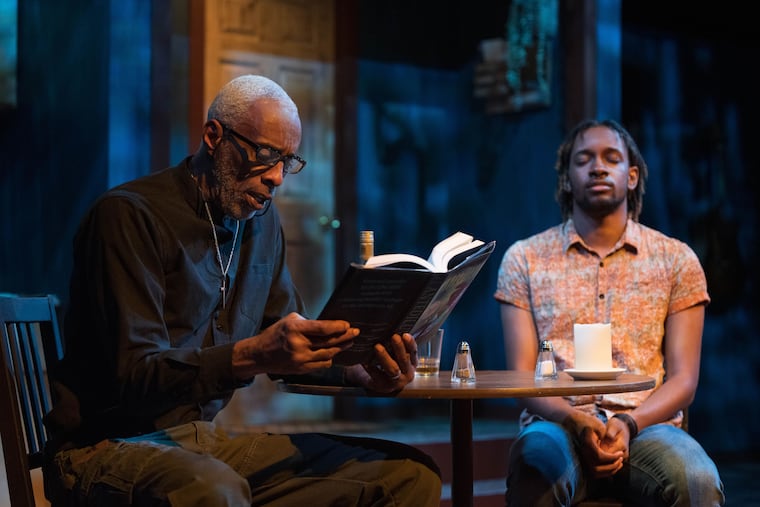James Ijames’ new play ‘Reverie’: a moving meditation on grief, healing and roads not taken
The conflict in Reverie involves whether two mourners can forge a connection that will lighten their emotional burden.

It was big news recently when James Ijames, co-artistic director of the Wilma Theater and a prolific playwright, won the Pulitzer Prize for Drama for Fat Ham. A loose transposition of Hamlet to the setting of a Black family barbecue, the play premiered last year in a Wilma digital production and currently is running at New York’s Public Theater.
So it’s a great coup for little Azuka Theatre to debut a promising new Ijames play, Reverie, at the Proscenium Theatre at The Drake through May 22. Of the Ijames works I’ve seen (the others were Kill Move Paradise at the Wilma and TJ Loves Sally 4Ever at Theatre Horizon), this moving meditation on grief, healing, and roads not taken is my favorite.
Though it makes no mention of COVID-19 or its traumatic wake, this 90-minute, intermission-less show, sensitively directed by Jerrell L. Henderson, is yet another drama that seems tailored for our pandemic era.
The action begins when Jordan (David Bazemore), a graduate student in comp lit, opens the door of his clothing-strewn South Philly apartment (designed by Marie Laster) to a surprise: an unannounced, initially awkward visit by the father of a recently deceased former lover.
Jordan’s guest, the Rev. Paul Carter (Damien J. Wallace), has found the younger man through a notation in a dystopian novel lent to his son, Lucas. Paul has flown to Philadelphia from rural North Carolina to learn more about Lucas’ relationship with Jordan, and to wrestle with his paternal regrets. It turns out that Jordan, though he has moved on romantically, has regrets of his own.
Anyone who’s known grief knows how powerfully regret and guilt factor into mourning. And understands, too, as Ijames does, the impulse to accrete new details and stories about the deceased as a way of making that person live more fully in our imaginations. “I want to know him. His life,” Paul says.
The conflict in Reverie, sketched with some subtlety by Ijames and beautifully embodied by Bazemore and Wallace, involves whether these two mourners, with so little apparently in common, can forge a connection that will lighten their emotional burden.
Bazemore, seen earlier this year in InterAct Theatre Company’s This Bitter Earth, adds a touch of humor to his role, and Wallace is profoundly affecting as Lucas’ bereaved father. It’s notable that Ijames doesn’t make Paul a bigot, but instead someone wrestling with his own sexual identity.
The show’s title plays on the word “reverend,” but mostly alludes to Ijames’ main theatrical device: the periodic appearances of Lucas (Justin Mitchell, naïve and mostly endearing) in surrealistic scenes that seem to combine memory and wish fulfillment. Which element predominates isn’t always immediately clear – one of the play’s enchantments, but also a source of confusion. (J. Dominic Chacon’s dusky lighting sets the mood.)
Reverie has two possible endings, and Ijames seems still to be deciding just how to shape these final scenes for maximum impact. But, in this fine Azuka production, he already has managed to excavate and express some core universal truths about how we can help each other stumble through loss to firmer emotional ground.
“Reverie” is presented by Azuka Theatre at the Proscenium Theatre at The Drake, 302 S. Hicks St., through May 22. Masks and vaccination proof required. Tickets: Pay-what-you-decide after the show. Information: azukatheatre.org or 215-563-1100.